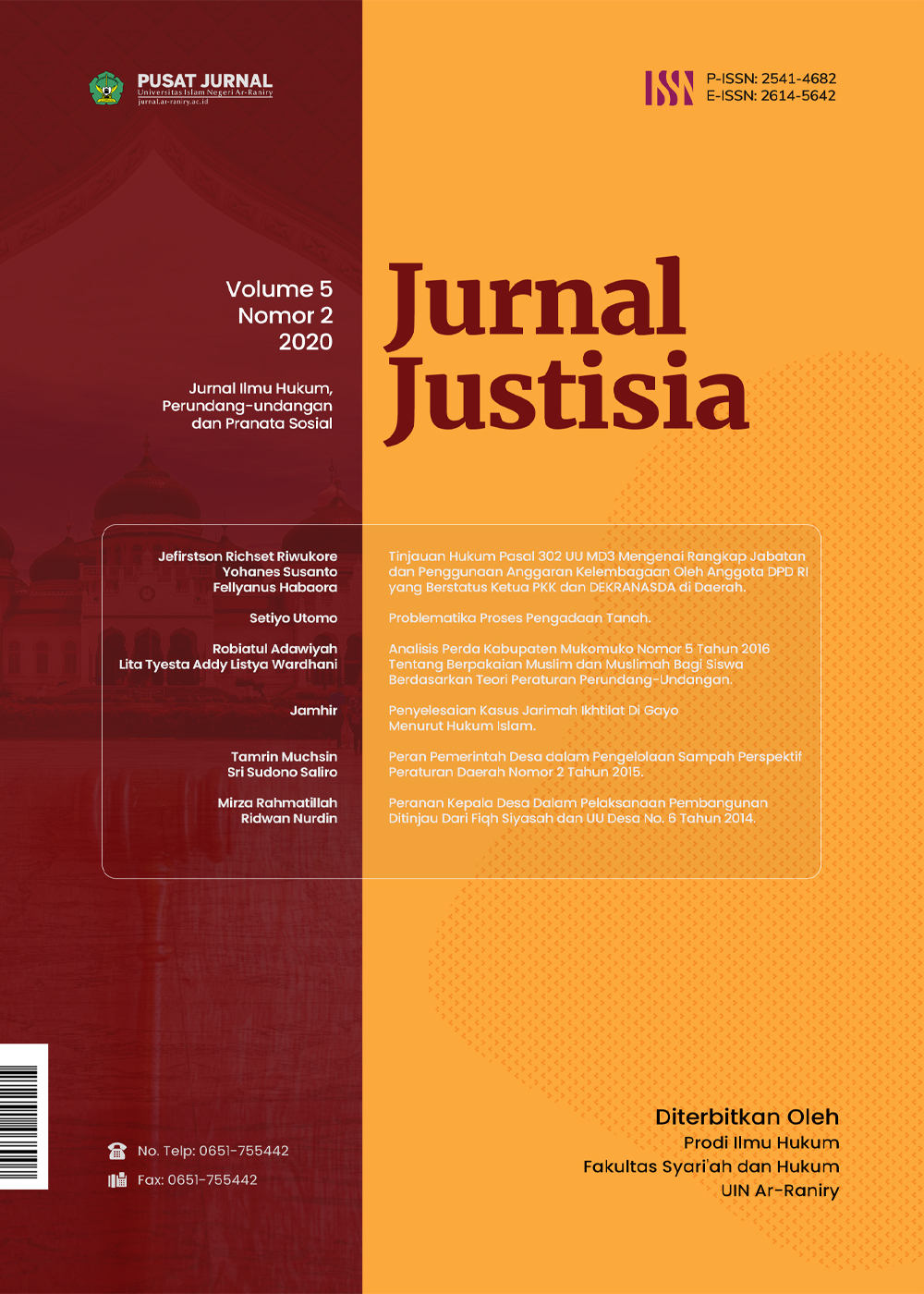Peranan Kepala Desa Dalam Pelaksanaan Pembangunan Ditinjau Dari Fiqh Siyasah dan UU Desa No. 6 Tahun 2014
DOI:
https://doi.org/10.22373/justisia.v5i2.8456Abstract
The success of developing a village cannot be separated from the role of the Village Head and the entire community. A developed village can be seen from the adequate facilities and infrastructure. The head of government has a big responsibility for the progress of his village in order to create a prosperous society. The formulation of the problem in this study is how the role of the village head in the implementation of development in Li-Eue Village and how the Siyasah Fiqh and Village Law review the role of the village head in the implementation of development in Li-Eue Village. This type of research is classified as field research (field research), which is descriptive analysis, namely research that tells and describes data sourced from primary data through interviews, observations and reports in the form of documents and secondary data by conducting library research in the form of Al- Qur'an, Hadiths, opinions of scholars, laws and regulations, documents and books and other scientific works. Based on the results of the analysis, it can be concluded that the role of the Li-Eue Village head in the implementation of development in Li-Eue Village is generally less than optimal so that it is less trustworthy or responsible for the duties as village head. Judging from the existence of several developments that have not been implemented. And less transparent and less mobilizing community participation. Review of Siyasah Fiqh and Village Law, namely leaders who are less trustworthy and less responsible.
References
Abdullah Ad-Dumaiji, (2016), Konsep Kepemimpinan Dalam Islam, Jakarta: Ummul Qura.
Baharuddin & Umiarso, (2016), Kepemimpinana Pendidikan Islam, Jogjakarta: Ar-Ruzz Media.
Farid Abdul Khaliq, (2005), Fiqih Politik Islam, Jakarta: Amzah.
Hadari Nawawi, (1993), Kepemimpinan Menurut Islam, Yogyakarta: Gadjah Mada University Press.
Muhammad Harfin Zuhri, (2014), Konsep Kepemimpinan Dalam Persfektif Islam, Vol. 19.
Muhammad Iqbal, (2014), Fiqh Siyasah Kontekstualisasi Doktrin Politik Islam, Cet Ke-1, Jakarta: Prenadamedia Group.
Sarman dan Mohammad Taufik Makarao, (2011), Hukum Pemerintahan Daerah di Indonesia, Jakarta: Pt Rineka Cipta.
Undang-undang Nomor 25 Tahun 2004 Tentang Sistem Pembangunan Nasional
Undang-undang Nomor 6 Tahun 2014 Tentang Desa
Veithzal Rivai dan Deddy Mulyadi, (2012), Kepemimpinan Dan Perilaku Organisasi, Jakarta: Rajawali Pers.
Veithzal Rivai, Bachtiar, dan Boy Rafli Amar, (2013), Pemimpin dan Kepemimpinan dalam Organisasi, Jakarta: Rajawali Pers.
Downloads
Published
Issue
Section
License
The Authors submitting a manuscript do so on the understanding that if accepted for publication, copyright of the article shall be assigned to Jurnal Justisia : Jurnal Ilmu Hukum, Perundang-undangan dan Pranata Sosial, Ar-Raniry State Islamic University, Indonesia as the publisher of the journal.
Jurnal Justisia : Jurnal Ilmu Hukum, Perundang-undangan dan Pranata Sosial right of first publication with the work simultaneously licensed under Creative Commons Attribution-ShareAlike 4.0 International License (CC BY-SA 4.0) that allows others to share (copy and redistribute the material in any medium or format) and adapt (remix, transform, and build upon the material) the work for any purpose, even commercially with an acknowledgment of the work's authorship and initial publication in Jurnal Justisia : Jurnal Ilmu Hukum, Perundang-undangan dan Pranata Sosial. Authors are able to enter into separate, additional contractual arrangements for the non-exclusive distribution of the journal's published version of the work (e.g., post it to an institutional repository or publish it in a book), with an acknowledgment of its initial publication in Jurnal Justisia : Jurnal Ilmu Hukum, Perundang-undangan dan Pranata Sosial. Authors are permitted and encouraged to post their work online (e.g., in institutional repositories or on their website) prior to and during the submission process, as it can lead to productive exchanges, as well as earlier and greater citation of published work (See The Effect of Open Access).

